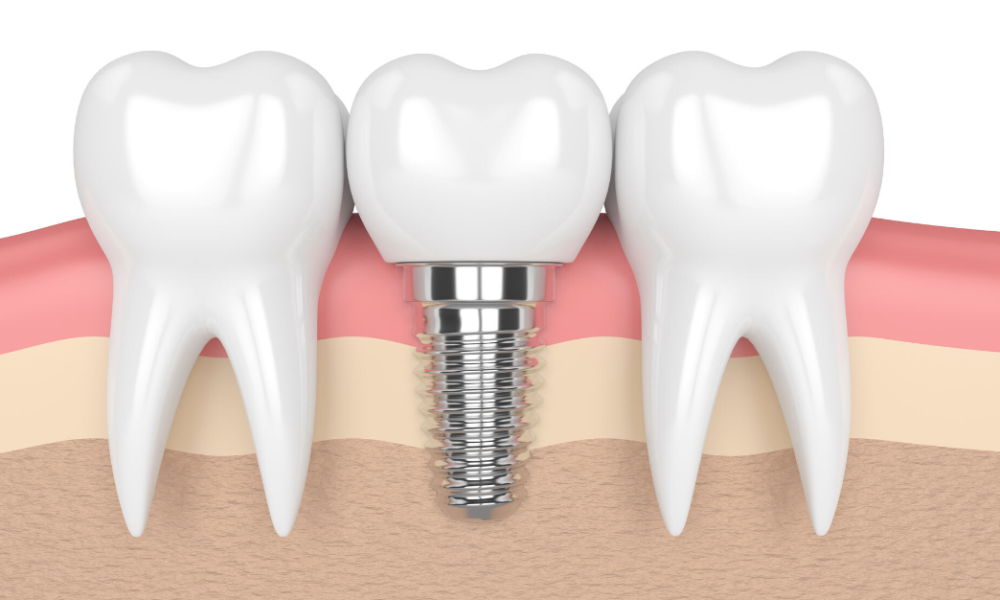Dental implant failure is a relatively common issue that can happen months or years after your implant placement procedure. It could be caused by various factors, such as health conditions, medications taken and poor oral hygiene practices.
The most frequent dental implant failure occurs due to an infection known as peri-implantitis, which develops around the implant and causes bone loss. If this is the case for you, your dentist may suggest a bone and soft tissue graft in order to save the implant.
Dental implant surgery is a popular and effective way to replace missing teeth. However, in some cases, it may be necessary to remove a dental implant due to complications or problems. The removal of a dental implant is known as an explant procedure, and it involves the careful disassembly and removal of the implant from the jawbone.
There are several reasons why a dental implant may need to be removed. These can include infection, implant failure, bone loss, or other issues that make the implant unstable or unsuitable for use. In some cases, the removal of a dental implant may be necessary in order to prepare for a replacement implant.
At Dental Implant Turkey, we understand the importance of safe and effective implant removal procedures. Our experienced dental professionals use the latest techniques and technology to minimize discomfort and ensure a successful outcome. If you are experiencing problems with your dental implant, contact us today to learn more about our services and how we can help you achieve a healthy, beautiful smile.
Poor Oral Hygiene

Maintaining good oral hygiene is an essential step in avoiding dental problems and keeping your teeth healthy. This includes regular brushing and flossing to eliminate plaque that builds up on the surface of your teeth and gums.
Neglecting to practice proper oral hygiene can lead to bacteria buildup in your mouth and around your dental implants, potentially leading to infections and other dental issues.
Your teeth and gums are integral to the health of your entire body, as diseases that affect one part can spread to other parts, leading to systemic (whole-body) inflammation.
Infection
Dental implants can last a lifetime when properly taken care of. This requires brushing and flossing on a daily basis, in addition to regular cleanings and exams at your dentist’s office.
However, if the implant is not kept clean, bacteria can enter and attack surrounding tissue. If left unchecked, this infection could eventually destroy supportive tissues, leaving the implant weak and vulnerable to breakage or failure.
That is why it is essential to practice good oral hygiene and consume a nutritious diet. Furthermore, avoid smoking or tobacco use as these can weaken the body’s ability to fight off infections.
Poor Placement
Dental implants can be an attractive and durable alternative to dentures and bridgework, offering strength, aesthetics, and long-term stability. However, they come with certain risks too.
An improper placement of the implant can lead to complications like bone loss, infection, and even failure of the device itself.
This can be a frustrating issue, as it may lead to a compromised restoration that doesn’t offer optimal functionality or aesthetic appeal.
Accurate placement of your dental implants is critical for success, and this requires an intimate knowledge of the anatomy of your jawbone.
Planning this treatment requires meticulous coordination between all parties involved, from the dentist who places the implant to the restorative dentist who will ultimately restore it. Furthermore, coordination with a dental laboratory is necessary so all parties are aware of potential limitations and difficulties during this phase.
Smoking or Alcohol Consumption

Smokers and drinkers have an increased likelihood of dental implant failure compared to nonsmokers. This is because both habits are toxic to the body, so when combined they lead to worse health outcomes.
Smoking restricts blood flow to the gums and slows healing, leading to deeper wounds and weakening implants.
Bone loss and infection can occur, as well as implant shifting or loosening from its jawbone.
Smoking increases the risk of heart disease and other serious medical problems. That is why quitting smoking is important if you are a smoker; doing so prior to any invasive surgeries like dental implants can improve their success rates.
Bone Loss
Bone loss can be caused by a number of factors, including aging and certain medical conditions. It’s commonly linked to osteoporosis – an ailment in which bones break down faster than they are formed by the body.
People at high risk for osteoporosis tend to lose bone mass as they age, particularly women of certain races and those with smaller body types and a history of diseases like Type I diabetes, rheumatoid arthritis, celiac disease (a wheat gluten allergy that interferes with calcium absorption) and hyperthyroidism.
Dental implants prevent bone loss by stimulating the jaw bone to grow new cells and maintain its density. Unfortunately, once you lose a tooth, this stimulation stops and you could experience up to 25% decrease in jaw bone mass within one year after tooth extraction.

Leave a Reply